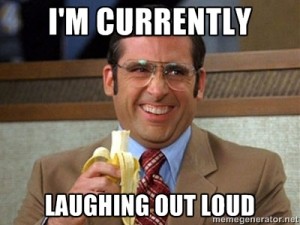I like to laugh a lot, and honestly, who doesn’t? Nonetheless, I have always been known to laugh more than the average teenager. Unfortunately, this is not always a good quality. When I hear bad news or someone else tells me a sad story, my first instinct is to try and laugh it off. Although humor can be used as a coping mechanism, there are some circumstances where I have gotten myself in some trouble. Anyways, in the majority of situations, scientists, and the public in general, believe that laughter has numerous health benefits, but is there any validity behind this belief, and is it fair to say that laughter is actually the best medicine?

There are many theories that laughing is healthy, with numerous short and long term benefits. According to the Mayo Clinic, laughter can increase the endorphins that are released by the brain, which can trigger a positive feeling in people’s bodies. Laughing is also thought to increase oxygen intake and stimulate muscles, lungs, and the heart. Additionally, laughter can help to relax muscles, relieving stress and tension in the body. On the other hand, one possible long term effect of laughing is that it helps the body produce its own natural painkillers. Similarly, by releasing neuropeptides, the body can possibly prevent disease more effectively for people who laugh a lot. Unfortunately, none of these beliefs are supported by any evidence in this instance.
Most people, even some scientists and professionals in medicine, just accept the fact that laughter is beneficial. Luckily, there are multiple studies in regards to the relationship between laughter and health benefits that at least strive to provide some evidence of the null hypothesis, that laughter does not cause health benefits, or the alternative hypothesis, that laughter does cause health benefits. In one small study of 20 people between the ages of 60 and 80, conducted by researchers at Loma Linda University, the participants each took a quick memory test and saliva samples to measure their levels of cortisol, a stress hormone. Half were asked to watch a funny video, while the other half were supposed to sit silently. After about twenty minutes, the participants took another memory test and their cortisol levels were measured again. The group that laughed from the funny video improved by 43.6% in recalling events, while the group that sat silently only improved by 20.3%. The group that laughed also had a larger decrease in stress levels than the group that sat silently. Another small study conducted by Vanderbilt University indicated that laughing for about 10-15 minutes a day can burn up to 40 calories.
Other small studies, according to Susan Brink, suggested even more benefits of laughter. In a 2005 study, scientists calculated the blood flow of 20 people before and after they watched a sad and a funny movie. They discovered that after watching the funny movie, the average blood flow for each person had increased by 22%, whereas after the sad movie, the average blood flow was more restricted for 14 out of the 20 volunteers. Interestingly, a 2003 study of 33 women showed that not just laughing, but laughing out loud, had more natural killer cell activity, which helps people fight diseases. Lastly, according to Noreen Fraser, scientists have conducted multiple studies, which started in the 1970s, involving the relationship between laughing and brain waves. These scientists claim that laughter creates a sense of well-being by releasing endorphins from the brain.

While there are a substantial number of studies supporting the belief that laughter might, in fact, be the best medicine, none of these studies have been large enough. Also, many studies that supposedly “prove” that laughter is the best medicine are not conducted correctly. For instance, according to the University of Maryland Medical Center, in one of the few large-scale studies regarding this topic, researchers found that laughing will reduce the risk of heart disease. In an observational study of 300 people, where half had already either had a heart attack or heart surgery and half had not, the participants were given a questionnaire to rate themselves on how much they laugh in certain situations. Not surprisingly, the people who have never experienced a heart attack or heart surgery laughed more. I say “not surprisingly” because this study shows that people who have undergone heart surgery or a heart attack are less likely to laugh a lot, which is a fairly obvious conclusion. Yet, the researchers claim that this study proves the opposite, that laughter reduces the chance of getting a heart attack or heart surgery, which is absurd based on the manner in which the study was organized.
Besides incorrectly conducted studies, some studies simply do not provide enough evidence to reject the null hypothesis that laughter does not provide people with health benefits, or to fail to reject the null hypothesis. According to William Strean, researchers believe that studies determining whether laughter is the best medicine or not barely provide any evidence that laughter has positive health benefits. However, Strean does go on to admit that there really aren’t any negative effects of laughter. Thus, people can take the risk of laughing as it can really only cause positive health effects. Well, most of the time… (look at picture below).

Consequently, in my opinion, I believe people should laugh, but not because it is the best medicine. In class, we discussed how unhappiness does not actually correlate with sickness, despite many people’s belief that it does. This is a similar situation. I think it is safe to say, based off of studies that have been conducted so far, that laughter is definitely not the best medicine. The original saying was probably meant as an exaggeration, but in the literal sense of the phrase, I would consider it to be incorrect. However, numerous studies have indicated that laughter could cause certain health benefits. Although more research needs to be done, laughter can’t hurt anybody. Therefore, I would advise everyone to laugh, as people could easily gain health benefits from doing so, and if not, the worst that happens is that they wasted a few seconds of breath, which is not the end of the world.



















 Constant solitary confinement is truly a horrible thing; humans are social creatures, we actually need to socialize to stay mentally healthy. It
Constant solitary confinement is truly a horrible thing; humans are social creatures, we actually need to socialize to stay mentally healthy. It 





.jpg)












